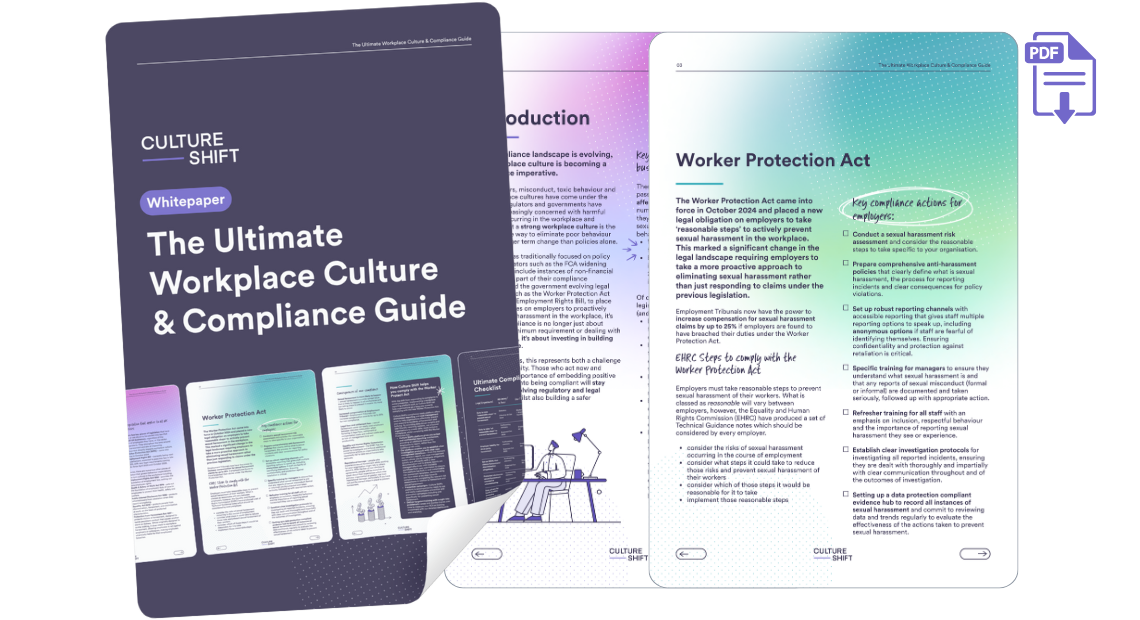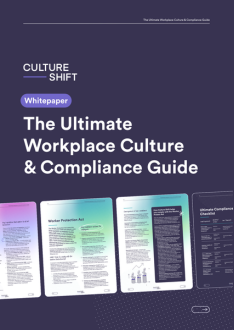An overview of Workplace Culture & Compliance Regulations in 2025/26
The workplace landscape in the UK is undergoing one of its most significant shifts in decades. A series of both new and forthcoming regulations are reshaping how organisations must approach culture, compliance and behaviour to prevent workplace harassment. These changes are not limited to large employers or specific industries, they apply to every organisation, regardless of size or sector.
At the centre of this shift are two key pieces of legislation: The Worker Protection Act which came into force in October 2024 and the Employment Rights Bill, expected to pass into law in late 2025. Together they introduce stronger legal duties for employers, moving beyond reactive responses to harassment and requiring proactive steps to create safe and inclusive workplaces.
Alongside these key pieces of legislation, sector-specific regulations and guidance is also emerging in higher education, finance and the creative industries, each designed to raise the standards and hold organisations accountable for addressing bullying, harassment and misconduct.
This overview explains the key legislative changes, what they mean for employers and how tools like Culture Shift can support organisations in meeting their new obligations whilst fostering healthy workplace cultures.
Quick links:
Employment Rights Bill
The Employment Rights Bill is expected to become law in Autumn 2025 and when passed will have significant changes to employment law in the UK. Whilst a few changes are expected to come into force before the end of 2025, most of them will happen across 2026 and 2027.
Stronger duty to prevent sexual harassment
Currently employers must take reasonable steps to prevent sexual harassment under the Worker Protection Act. The law would be strengthened to require employers to take “all” reasonable steps to prevent workplace harassment (expected October 2026).
In 2027, the law is expected to change further to specify what ‘reasonable steps’ mean when preventing sexual harassment.
Third party harassment
Under current legislation employers are not explicitly or directly liable if their employees are harassed by customers, clients or other third parties.
The Bill would make employers liable for third party harassment across all protected characteristics, unless the employer took all reasonable steps to prevent this. This covers all types of harassment not just sexual harassment (expected October 2026).
Ban on NDAs in harassment claims
Non-Disclosure Agreements (NDAs) or any other type of agreement that prevents a worker from making allegations or disclosures about harassment or discrimination are also set to be abolished, removing clauses that prevent employees from speaking out about their experiences of work-related harassment or discrimination. There is currently no date published on when this may come into force.
Whistleblowing protections for sexual harassment disclosure
Sexual harassment is expected to become a new category of ‘protected’ disclosure under whistleblowing law, meaning that whistleblowers reporting sexual harassment will get protection from detriment and dismissal when making a disclosure (expected April 2026).
Additional Employment Rights Bill resources:
Worker Protection Act
The Worker Protection Act came into force in October 2024 and placed a new legal obligation on employers to take ‘reasonable steps’ to actively prevent sexual harassment in the workplace.
This marked a significant change in the legal landscape requiring employers to take a more proactive and preventative approach to eliminating sexual harassment rather than just responding to claims under the previous legislation.
Employment Tribunals now have the power to increase compensation for sexual harassment claims by up to 25% if employers are found to have breached their duties under the Worker Protection Act. As a result of this new legislation, new research has found the number of workplace sexual harassment enquiries made to Acas has risen significantly.
A freedom of information request submitted to Acas by law firm Nockolds revealed that, in the first half of 2025, calls to the Acas helpline asking for advice on harassment at work increased by 39 per cent to 5,583 – up from 4,001 in the same period last year. This significant increase highlights the immediate impact of the Worker Protection Act in raising awareness and encouraging individuals to seek advice on workplace harassment, underscoring the need for employers to proactively address and prevent such issues.
Additional Worker Protection Act resources:
This handy guide outlines what firms must do now to prepare – including an actionable FCA NFM Compliance Checklist for boards, risk & compliance teams, and HR functions.
Download your copyFCA Non-Financial misconduct rules
From 1 September 2026, the FCA’s Code of Conduct (COCON) will extend to cover Non-Financial Misconduct (NFM). This means every financial firm – not just banks – must treat serious bullying, harassment, and other poor behaviour as regulatory misconduct.
All incidents of ‘serious, unsubstantiated poor personal behaviour’ such as bullying and sexual harassment, including misconduct that happens outside of work, will need to be reported to the FCA using the same process that currently applies to reporting financial misconduct.
The “fitness and propriety” assessments (FIT) will consider non-financial misconduct in determining whether individuals are suitable for regulated roles
Additional FCA Non-Financial misconduct resources:
NHS Sexual Safety Charter
The NHS Sexual Safety Charter, launched in 2023, represents a system-wide commitment to eradicating sexual harassment and unwanted behaviour across healthcare settings. It sets out ten core principles to help NHS organisations implement and enforce a zero-tolerance approach to sexual misconduct, protecting staff and ensuring a safe, respectful working environment. More than 270 NHS organisations and all ten ambulance bodies have signed the charter, demonstrating growing alignment between workforce wellbeing and regulatory compliance.
Despite this commitment, sexual harassment, violence and bullying remain widespread across the NHS. In 2024 alone, 58,000 NHS staff reported unwanted sexual behaviour, while 1 in 7 faced physical violence in the past year. These figures highlight the scale of the issue — and the urgent need for NHS Trusts to move beyond policy statements toward measurable, evidence-based action.
To comply with the charter and meet wider legislative duties, including the Worker Protection Act and Public Sector Equality Duty, NHS organisations must ensure they have effective systems for reporting, case management, and data collection. Meeting these standards is not only a matter of staff safety but also one of legal, regulatory and reputational accountability.
NHS Sexual Safety Charter resources:
OfS E6 Condition of Registration
The OfS E6 Condition of Registration came into force on 1 August 2025 and has been introduced to regulate how higher education institutions (HEIs) in England prevent and address harassment and sexual misconduct.
This regulation aims to create safer environments for students by establishing clear requirements for handling these issues. It addresses the need for institutions to take significant and credible steps to protect students from behaviour that may amount to harassment and/or sexual misconduct.
It encourages institutions to not only prevent such incidents but also respond effectively when they occur. The regulation places importance on defining unacceptable behaviours, ensuring transparent processes for reporting, investigating and resolving complaints.
It also requires institutions to maintain a single comprehensive source of information on related matters so that all stakeholders are aware of institutional policies, procedures including rules relating to intimate personal relationships between relevant staff and students. Under Condition E6 higher education providers in England are required to have effective and accessible reporting mechanisms for incidents of sexual harassment and misconduct. This includes providing clear information on where and how students can report such behaviour, and it explicitly supports anonymous reporting routes. This comprehensive approach ensures a safer and more accountable environment for students, fostering a culture where harassment and sexual misconduct are actively prevented and effectively addressed.
Additional OfS E6 Condition of Registrationresources
The Creative Industries Independent Standards Authority (CIISA)
The Creative Industries Independent Standards Authority (CIISA) is a new industry funded, independent body created to uphold and improve standards of behaviour across the creative industries. Its aim is to tackle all forms of bullying, discrimination and harassment, raising the standards across the industry to enable safe and inclusive working environments.
CIISA aims to provide an independent safe space where individuals can report instances of poor workplace behaviour without fear of repercussion, knowing that their concerns will be taken seriously.
The CIISA Standards sets out the minimum standards of behaviour expected across the UK’s creative industries and are scalable to any size of organisation, production or project. The Standards have been developed in collaboration with individuals and organisations in the industry and align to existing legal requirements for both individuals and organisations.
Additional CIISA resources:
Culture Shift equips you with the tools to meet compliance obligations, protect your people, and strengthen your workplace culture in one easy-to-use platform – We’d love to show you around!
Book your demo todayHow Culture Shift keeps you compliant
Culture Shift’s compliance-ready platform offers anonymous reporting and case management tools to help organisations effectively prevent and respond to incidents of harassment and bullying.
By providing data-driven insights and user-friendly reporting systems, we empower organisations to create safer, more inclusive workplaces whilst complying with the Worker Protection Act, forthcoming Employment Rights Bill and sector specific regulations.
- Culture Shift’s platform gives you a clear and confidential reporting mechanism with both anonymous and named reporting options, providing an additional, confidential method for employees to report, rather than through the traditional HR route, breaking down barriers to reporting and helping to build a speak up culture.
- Our platform enables you to establish clear investigation protocols with case management workflows – from the moment you receive a report, our case management system allows you to investigate allegations quickly and efficiently with a clear documentation trail to ensure reports are managed effectively with trackable workflows from case submission to closure.
- Culture Shift’s platform centralises data, analytics and reports giving you insight into problematic areas, allowing you to adjust your prevention methods accordingly to proactively prevent harm, whilst our report builder gives boards and teams the information they need to monitor culture.
- Our platform can help you save money and deliver targeted training by using the data available to monitor trends over time, targeting your training and measuring ROI on training investment with our detailed dashboards and analytics.
By implementing our platform, it demonstrates that:
- You have robust reporting procedures in place that can be used to report both internal and third-party misconduct
- You have a clear case management process and audit trail to ensure every report is managed correctly and can fully evidence your prevention methods
- You have access to accurate data and analytics that allow you to monitor and address trends through proactive prevention, included targeted training




